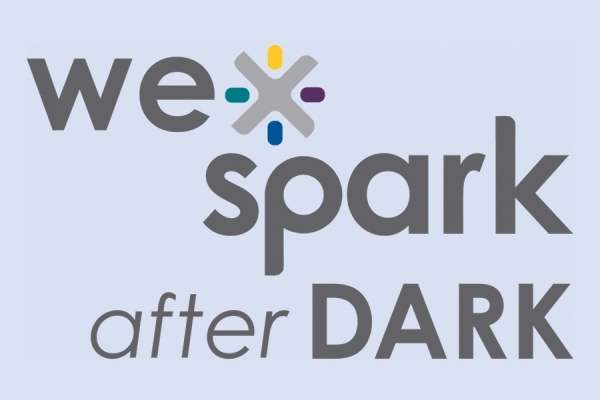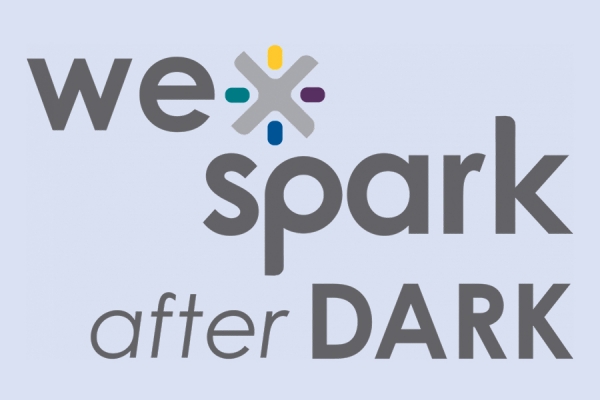
Business professor exploring innovative methods in analytics Yawo Mamoua Kobara, assistant professor in the Odette School of Business, uses statistical analysis to address social and business challenges. With a keen interest in mathematics, assistant professor Yawo Mamoua Kobara was drawn to explore statistics with the goal of using data to address business challenges and support decision-making in emerging economies. Dr. Kobara has earned two master’s degrees — one in mathematical sciences and another in financial engineering — along with a PhD in statistics which has driven his research interests. He explores using statistical analysis to address social and business challenges, focusing on areas of healthcare and finance. Joining the University of Windsor as a new member of the Black Scholars’ Institute (BSI), Dr. Kobara’s research aims to develop tools and insights to improve patient flow and minimize discrimination in the healthcare system. DailyNews will showcase the contributions and insights of members of the Black Scholars Institute…

Law professor to advise on sustainability in education Anneke Smit, associate professor in the Faculty of Law, has taken up a one-year appointment as special advisor to the provost on the Detroit-Windsor United Nations Regional Centre of Expertise for Sustainability in Education. Provost Robert Aguirre has appointed law professor Anneke Smit to a one-year post as special advisor to the provost on the Detroit-Windsor United Nations Regional Centre of Expertise for Sustainability in Education (UN-RCE). A joint initiative of the University of Windsor and Wayne State University, the Detroit-Windsor RCE will anchor exchange and research on urban sustainability and connect ongoing community initiatives in the greater Detroit-Windsor region. The local centre is the only cross-border entity among approximately 180 such centres globally. Dr. Aguirre called it uniquely situated to address a range of pressing issues, including sustainable and equitable land use planning and housing policy; environmental justice and the protection of water and land; industry…

WE-SPARK Health Institute Releases 5th Annual Impact Report WE-SPARK Health Institute has proudly released its 5th Annual Impact Report, covering the period from May 2023 to April 2024. Since its inception in 2019, WE-SPARK Health Institute has been committed to advancing research, education, and community engagement in Windsor-Essex. Over the past five years, the institute has celebrated significant milestones, driven by the collaborative efforts of its members, partners, and supporters. Thanks to the dedication of WE-SPARK members and a highly successful grants program—awarding over $1 million in seed and bridge grants—the institute has fostered substantial growth in health research across the region. Their events and student programs have played a critical role in aligning with advancements in health research. The institute’s influence on national health research funding has been profound, with the region’s funding tripling since WE-SPARK’s founding. This increased focus has enhanced the region’s profile and positively impacted local…
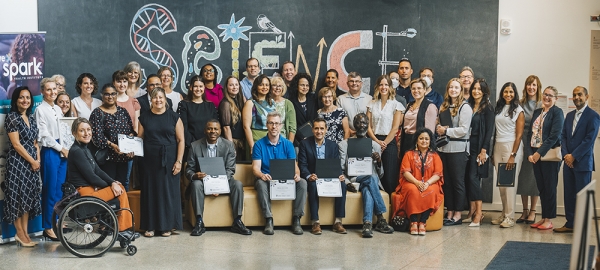
$412,714 AWARDED LOCALLY FOR HEALTH RESEARCH Researchers behind 20 projects aimed at tackling local health challenges received a total of $412,714 in funding. Twenty research projects aimed at tackling local health challenges have been awarded a total of $412,714 from the WE-Spark Health Institute and its partners. Lead investigators received their grants August 28, 2024 at the University of Windsor’s Centre of Research Excellence (CORe). “We absolutely need research to keep us moving forward, to make advances in our society and to better the lives of the people around us,” Dora Cavallo-Medved, interim director of WE-Spark, said. The grants are designed to support early-stage health research and education projects in Windsor-Essex. The initiatives aim to address healthcare gaps and spark new ideas across the sector, involving more than 140 researchers, trainees, and thousands of participants. Collaborators include WE-Spark’s five supporting institutions: the University of Windsor, St. Clair College, Windsor Regional Hospital,…
September networking event to bring together health research community WE-SPARK Health Institute hosts monthly networking events for members of the Windsor-Essex health research community to get to know one another through fun and casual conversations. There is no formal agenda, and all are welcome. This is an opportunity for anyone interested in health research to make connections in an informal and enjoyable atmosphere. The next event will be held Thursday September 5th from 5-8pm at the Bourbon Tap & Grill, 1199 Ottawa St, Windsor. No RSVP is required. WE-SPARK Health Institute is an innovative partnership between the University of Windsor, Erie Shores HealthCare, Hôtel-Dieu Grace Healthcare, St. Clair College, and Windsor Regional Hospital. The institute unites health research strengths, expertise, and infrastructure from across the Windsor/Essex region, fostering collaboration and advancing healthcare innovation.
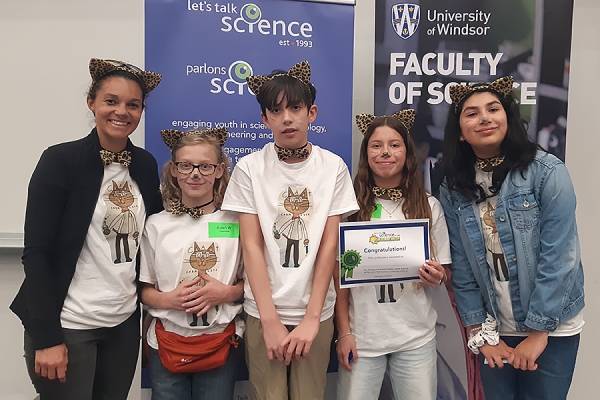
Event challenges youths to engage in science The Cat Chemists team won the Lorna Collins Spirit Award at the annual Let’s Talk Science Challenge. More than 150 enthusiastic young students from across Windsor-Essex gathered at the University of Windsor’s Erie and Dillon halls for the annual Let’s Talk Science Challenge. The event was filled with competitions and hands-on activities designed to ignite a passion for science among young learners. The day began with the “Ultimate Quiz Challenge,” testing students’ science knowledge. In the afternoon, the Design Challenge allowed participants to showcase their problem-solving and teamwork skills. Throughout the day, students engaged in various interactive science activities, further enriching their experience. Hadia Malik (BSc 2024), an organizer and recent graduate in medical physics, participated in the challenge herself during Grades 6 and 7. She noted that her early involvement sparked a lasting passion for science, leading her to pursue a Bachelor of Science degree at…

Study highlights disparities in support for racialized students with ADHD Sanya Sagar’s study of the experiences of university students with Attention deficit hyperactivity disorder is published in the inaugural issue inaugural issue of the Journal of Critical Race, Indigeneity, and Decolonization. A recent study exploring the intersectional experiences of university students with Attention deficit hyperactivity disorder (ADHD) suggests that racialized students are less likely to receive support than their white peers. According to the report, racialized students seek treatment less frequently and tend to receive fewer stimulant prescriptions and academic accommodations. “When I saw this finding, I was a bit baffled,” said University of Windsor alumna Sanya Sagar (PhD 2022), who led the study while working toward her doctorate in clinical neuropsychology. “So I dug into the literature, hoping to find a reason. The literature indicates that clinicians and doctors may have inherent biases that can hinder students from receiving treatment.” The study,…
July networking event to bring together health research community WE-SPARK Health Institute hosts monthly networking events for members of the Windsor-Essex health research community to get to know one another through fun and casual conversations. There is no formal agenda, and all are welcome. This is an opportunity for anyone interested in health research to make connections in an informal and enjoyable atmosphere. The next event will be held Thursday July 4th from 5-8pm at the Bourbon Tap & Grill, 1199 Ottawa St, Windsor. No RSVP is required. WE-SPARK Health Institute is supported by an innovative partnership between the University of Windsor and Erie Shores HealthCare, Hôtel-Dieu Grace Healthcare, St. Clair College, and Windsor Regional Hospital that brings together health research strengths, expertise, and infrastructure from across the Windsor-Essex region.
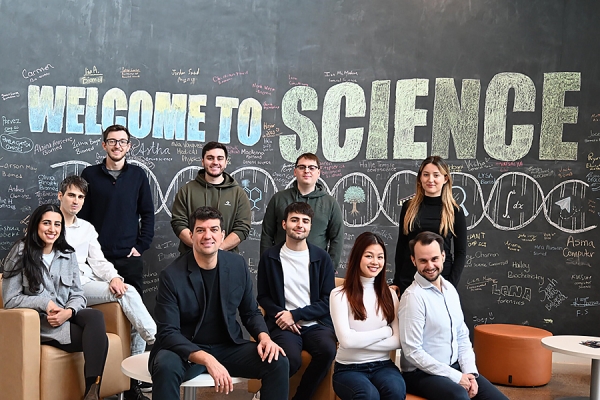
Implants explored as way to prevent recurrence of brain cancer The research group of chemistry professor Nick Vukotic (seated in jacket) is exploring biodegradable material to treat brain cancer. Professor Nick Vukotic is helping design a novel biodegradable material that could potentially treat one of the deadliest brain cancers, glioblastoma. Once implanted, the polymeric material would deliver chemotherapy medications. The release rate of the drug would be controlled by how fast that polymer degrades or breaks up. “Brain cancer is very challenging to treat due to the impermeability of the blood-brain barrier and the sensitivity of the organ, with glioblastoma multiforme being one of the deadliest treatment-resistant cancers,” says Dr. Vukotic, an assistant professor in the Department of Chemistry and Biochemistry. “We want to apply the chemistry to chemotherapy agents so that after the surgeons take out the primary tumour, they could place our drug-embedded polymer materials inside the surgical site to slowly release the chemotherapy agent…






